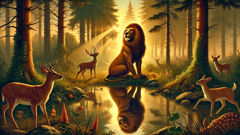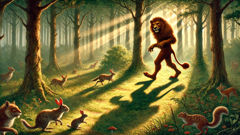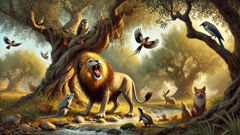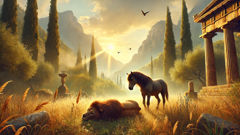Introduction
In the heart of ancient Arcadia, where the olive groves shimmered under a golden sun and mountains cradled the lushest valleys in all of Greece, the lives of humble creatures unfolded alongside heroes and gods. Here, legends found their footing in the rich loam, and the smallest of beings could stumble into the greatest of stories. Among the many animals that made the Arcadian forest their home was a gray-brown ass named Melas. He was not remarkable to look at: his coat was rough, his back bore the weary marks of many burdens, and his voice, when he brayed, was anything but melodious. Melas spent his days in service to old Kallistratos, a kindly but forgetful woodcutter whose hands had long lost the strength of youth. They were a mismatched pair—one bent with age, the other with humility. Yet, it was not among men that Melas’s true adventure began, but among the wild and watchful creatures who dwelled beyond the olive groves. The Arcadian valley was a place of subtle wonders. The dawn mist swirled between ancient cypress and pine, birds called out in symphonies, and at night, the stars themselves seemed to rest on the treetops. It was a land where every creature had its place, each life woven into the tapestry of the woods. Melas, for all his labor, harbored a quiet longing: to be more than what he was, to be seen as something grand and mighty. And so, when chance placed before him a discarded lion’s skin—left behind by a troop of hunters whose triumph had outlasted their interest—Melas’s world was set to change. The skin, tawny and regal even in its lifeless form, seemed to whisper promise. Melas could not have known that this chance discovery would draw him into the intricate dance of appearances and truth, fear and wisdom, that defined the valley’s stories. Thus began the fable that would echo through Arcadia for generations—a tale of an ass who dared to wear a lion’s skin and of the forest’s gentle reckoning with pride and pretense.
The Discovery of the Lion's Skin
Melas began his morning as he always did—waking to the clatter of old Kallistratos’s wooden pails and the distant trills of the Arcadian thrushes. The air was crisp with mountain coolness, and the world seemed to glow with the promise of another day’s labor. Melas shook his mane, blinking the sleep from his eyes, and trudged toward the clearing where Kallistratos awaited him. The old man’s tunic was patched, his beard as gray as the olive bark. Yet his eyes, though tired, always held kindness for his four-legged companion.

That day, however, Kallistratos’s mind was elsewhere. He spoke little, merely gesturing for Melas to follow the narrow path deeper into the woods. They passed beneath towering pines and skirted a shallow brook that gurgled over smooth stones. As the sun rose higher, Kallistratos stopped to gather firewood, instructing Melas to graze while he worked.
Melas wandered, nose to the earth, in search of tender shoots. As he meandered beyond the usual boundaries, he stumbled upon a patch of trampled earth. There, caught on a thorn bush and half-hidden by brambles, lay the skin of a lion. It was enormous—its golden fur still thick and wild, its mane a tangled halo. Melas stared in awe. He knew lions from stories: kings of the forest, feared by all.
Curiosity overcame caution. Melas pawed at the skin, sniffed it, even nibbled its edge. The scent of the lion lingered faintly, enough to send a shiver through his limbs. Yet no beast roared nearby, and no eyes glinted in the undergrowth. Emboldened, Melas nudged the skin free from the thorns and, with awkward persistence, draped it across his own back. The fit was clumsy, but to Melas’s mind, he looked magnificent.
He trotted to a pool of still water and gazed at his reflection. The image that met him was astonishing—a creature with a lion’s mane and golden hide, its eyes wide with wonder. Melas could hardly recognize himself. He strutted and tossed his head, marveling at how the sunlight played upon his new ‘fur.’
The transformation filled him with both joy and unease. He felt grand, powerful—even dangerous. For the first time in his humble life, Melas imagined what it must be like to inspire awe instead of dismissal. He forgot his heavy burdens, forgot Kallistratos and his daily rounds. Instead, the idea took root: what if the forest believed he truly was a lion?
As midday approached, Melas heard rustling from the brambles—a family of deer approached the clearing. Normally, they would ignore a passing ass, but Melas stood tall, the lion’s mane bristling around his ears. The deer froze, their eyes wide with terror. With a haughty toss of his borrowed mane, Melas stepped forward. The deer bolted into the trees without a backward glance.
The thrill that surged through Melas was unlike anything he’d known. Emboldened, he crept through the forest, each new encounter confirming his growing power. A flock of partridges scattered at his approach; even a wild boar, notorious for his bad temper, gave way at the sight of the lion’s silhouette.
Yet beneath the skin, Melas’s heart pounded with anxiety. He kept his head down, careful not to let his ears poke through the mane, and above all, he dared not utter a sound. He knew his bray would give him away, that his deception was fragile as morning mist. Still, for now, he was the king of Arcadia—at least in his own mind.
The Forest in Fear
Word spread quickly among the animals of Arcadia: a lion had returned to the valley. The rumor slithered through the grass and echoed from branch to branch, carried by sparrows and squirrels alike. The mere whisper of a lion’s presence was enough to disrupt the daily rhythms of the woodland. Rabbits hid in their burrows, the foxes kept to their dens, and even the proud stags thought twice before venturing beyond the safety of the glades.

Melas reveled in his new power. He paraded through sun-dappled meadows and darkened groves, careful to move with the slow, measured gait he imagined a lion would use. Wherever he went, animals scattered in fear, confirming what he desperately wanted to believe—that he was no longer overlooked or mocked, but respected and even feared.
With each passing day, Melas grew bolder. He ventured farther from Kallistratos and deeper into the wilderness. The skin, though heavy and awkward, became a second hide. He felt untouchable. His confidence blossomed into arrogance. The thrill of control became intoxicating.
Yet there were moments when doubt gnawed at him. He noticed the discomfort of the lion’s skin—how it grew hot beneath the midday sun, how it snagged on brambles and weighed upon his shoulders. He missed the simple pleasure of rolling in cool grass, or the friendly calls of smaller animals who no longer dared approach.
There were dangers, too, that Melas had never considered. One afternoon, while crossing a narrow ravine, he caught sight of a real wolf—sinewy and sharp-eyed. The wolf froze at the sight of Melas’s borrowed mane, hesitated, then slunk away. Melas exhaled in relief, but a chill clung to him long after. He wondered what might happen if the wolf decided to test this new ‘lion.’
In the village below, Kallistratos grew worried. He called for Melas along the winding forest paths, but his voice went unanswered. The old man asked his neighbors if they had seen his ass, and heard only wild tales of a lion prowling the woods. He shook his head in disbelief, but fear flickered in his heart.
Meanwhile, the animals gathered in secret councils. Wise old Teles the tortoise called for caution. “We must not let fear rule us,” he warned. “Lions are rare in these parts. Something is amiss.” The magpies agreed, their sharp eyes skeptical of the lion’s strange silence. The more the rumor grew, the more suspicion gnawed at its edges.
One day, Melas crossed paths with Dion, an elderly fox renowned for his cunning. Dion watched from the shadows as Melas moved awkwardly through the undergrowth, never roaring, never hunting, always alone. The fox narrowed his eyes, a plan forming in his clever mind.
That evening, as the sky blushed with the colors of sunset, Dion gathered the bravest creatures—the owl, the hedgehog, and the hare. “We will watch this lion together,” Dion whispered. “There is more to this tale than meets the eye.”
Hidden among the roots of an ancient oak, they waited as Melas approached. The ass, lost in thoughts of his newfound glory, failed to notice the watchful eyes upon him.
The Truth Unveiled
The following morning dawned bright and warm, with the scent of wild thyme drifting on the breeze. Melas woke beneath a stand of ancient olive trees, the lion’s skin still wrapped around him like a cloak of dreams. He rose and shook himself, stretching sore muscles before making his way down to a sparkling brook for a drink.

As Melas bent to sip from the cool water, he noticed something odd—a flock of magpies was perched unusually close, watching him with sharp, intelligent eyes. Their silence felt heavy. Suddenly, one bird cawed loudly, startling Melas into jerking his head up. The lion’s mane slipped slightly, revealing the unmistakable curve of his long, gray ear.
A chorus of whispers rippled through the brush. Dion the fox, who had crept closer during the distraction, called out from the undergrowth, “O mighty king of the forest, what brings you so low as to drink from our humble stream?”
Melas, caught off guard, panicked. He tried to reply in a deep growl but, forgetting himself, let out a resounding bray that echoed through the valley. The noise was so comically out of place that even the magpies fell silent in shock.
In that moment, every creature in the vicinity understood the truth: the fearsome lion was no lion at all, but a humble ass wrapped in borrowed glory. Melas’s heart plummeted. He tried to turn away, but the lion’s skin slipped further, tangling his legs. The magpies cackled, the fox grinned slyly, and even the timid hedgehog dared to emerge from his hiding place.
Dion stepped forward, his bushy tail flicking. “It seems our king has lost his roar,” he said, bowing with exaggerated courtesy. The laughter that followed was gentle but unstoppable. The tension of fear dissolved into relief—and then into a kind of joyous amusement.
Melas, mortified and ashamed, shed the lion’s skin entirely and stood exposed before the assembly of animals. He lowered his head, unable to meet their eyes.
But the forest was quick to forgive. The owl fluffed her feathers and offered a wise observation: “Every creature has its place. The lion is not feared for his mane, nor is the ass despised for his bray. We each serve the forest in our way.”
Dion nodded. “Appearances may deceive for a while, but truth is patient. It always finds its way.”
Relieved by their words, Melas thanked them humbly. He gathered up the lion’s skin and carried it to a rocky outcrop, leaving it there as a silent monument to his brief reign as king.
Conclusion
Melas returned to his life with Kallistratos, chastened but wiser. He no longer wished for the terror or awe that had once seemed so alluring. Instead, he discovered a quiet pride in being exactly who he was—a dependable companion, sturdy and steadfast, whose honest bray was welcomed in field and forest alike. The lion’s skin remained where he had left it, eventually reclaimed by sun and rain, its story fading into legend. But among the animals of Arcadia, Melas became something more valuable than feared: he was respected for his humility and remembered for his lesson. The fable of the ass in the lion’s skin was retold for generations—not as a warning against dreaming beyond one’s station, but as a gentle reminder that wisdom lies in embracing one’s true nature, for truth is always patient and sure to shine through in time.













